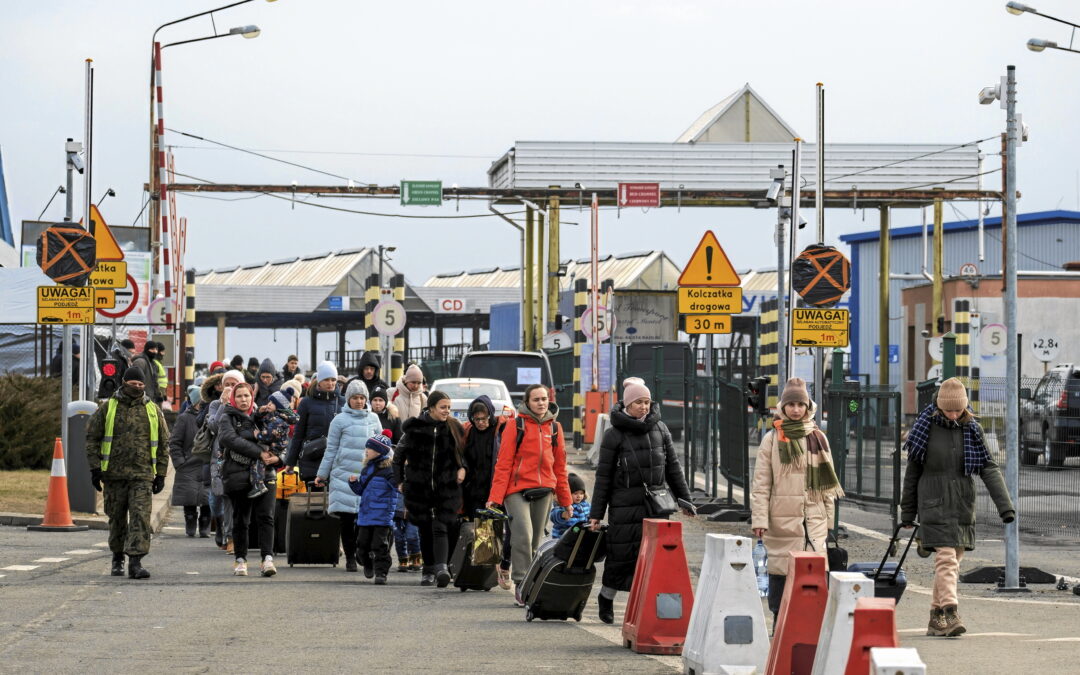Poland’s government is seeking to introduce new measures that will make it easier for Ukrainian refugees to obtain the right to work and to receive child benefits. A number of large employers have also been seeking ways to facilitate the employment of Ukrainians.
Since Russia invaded Ukraine last Thursday, over 500,000 people have crossed the border into Poland, around half of them children. While the Polish authorities and public have been providing accommodation, food, education, and other forms of support, current legal restrictions make working difficult.
Over half a million people have crossed the border from Ukraine into Poland since Russia's invasion last Thursday, the Polish border guard has announced.
Large numbers continue to arrive, including almost 52,000 today by 3 p.m. https://t.co/FQDED5bl8a
— Notes from Poland 🇵🇱 (@notesfrompoland) March 2, 2022
For a Ukrainian immigrant to legally work in Poland (as hundreds of thousands already do), they would normally obtain a visa from a Polish diplomatic post in Ukraine, notes Business Insider Polska. For obvious reasons, this has not been possible for those fleeing the war.
Meanwhile, those who apply for refugee status are not allowed to work for a minimum of six months, Łukasz Koszczoł, CEO of recruitment firm Job Impulse, told Business Insider.
He says that employers are keen to facilitate the “safe, legal and efficient employment of people who cross the Ukrainian-Polish border”.
Over 90% of Poles support accepting Ukrainian refugees, while 64% say they are personally willing to help them, according to two new polls
Recent days have seen a flood of support from Polish society for the hundreds of thousands of people fleeing Ukraine https://t.co/xe70yzxPuP
— Notes from Poland 🇵🇱 (@notesfrompoland) March 1, 2022
Poland’s minister for family and social policy, Marlena Maląg, says she has been in discussions with business leaders about the issue.
“We are preparing changes to the regulations that will allow for long-term support for Ukrainian citizens…related to their security, above all to opening the labour market,” she said, quoted by Dziennik Gazeta Prawna.
“We want Ukrainian citizens who cross the borders to have an open labour market with a stamp that allows them to legally reside in Poland,” Maląg added, noting that special legislation to that effect could be ready as early as today.
Shops in the provinces near Poland’s border with Ukraine were allowed to open yesterday despite the Sunday trading ban.
Providing necessities to refugees is clearly in the "greater good" and the law will shortly be clarified, a government spokesman said https://t.co/WksM8Rqza2
— Notes from Poland 🇵🇱 (@notesfrompoland) February 28, 2022
Business Insider reports that the regulations would simply require an employer to notify the authorities that they are employing a Ukrainian citizen under the new rules.
It also notes that some big employers, such as the Biedronka, Lidl and Kaufland supermarket chains and furniture store Jysk – are working on their own special simplified employment procedure for people who have fled Ukraine, as well as various support programmes for existing Ukrainian employees.
Biedronka announced last week that each of its Ukrainian staff will receive a payment of 1,000 zloty (€216), which have already begun to be paid out. Lidl and Kaufland are offering help to Ukrainian employees in finding accommodation for evacuated family members.
Warsaw's mayor says he will house Ukrainian refugees in a building that Russia claims ownership of.
The apartments were built in the 1970s as a luxury residence for Soviet diplomats and Moscow has ignored recent court orders to return the now-empty site https://t.co/d7gSGEFFix
— Notes from Poland 🇵🇱 (@notesfrompoland) March 1, 2022
Today, Maląg also assured that Ukrainian “parents will also have access to family benefits that are in force in Poland”. This would initially consist of the “500+” child benefit programme. Later, “if these women decide to stay in Poland, it will also [include] Family Care Capital and a Good Start”, she added, referring to two other government schemes.
Gertruda Uścińska, the head of Poland’s Social Insurance Institution (ZUS), which is responsible for benefits, told the Rzeczpospolita daily that her organisation would do all it could “to help ensure that they receive the [500+] child benefit”.
Maląg also revealed that the government had been in talks with the European Union about “funds for financial support from social programmes”, but said that it was still too early to reveal details, reports Wprost.
Main image credit: Patryk Ogorzalek / Agencja Wyborcza.pl

Daniel Tilles is editor-in-chief of Notes from Poland. He has written on Polish affairs for a wide range of publications, including Foreign Policy, POLITICO Europe, EUobserver and Dziennik Gazeta Prawna.




















